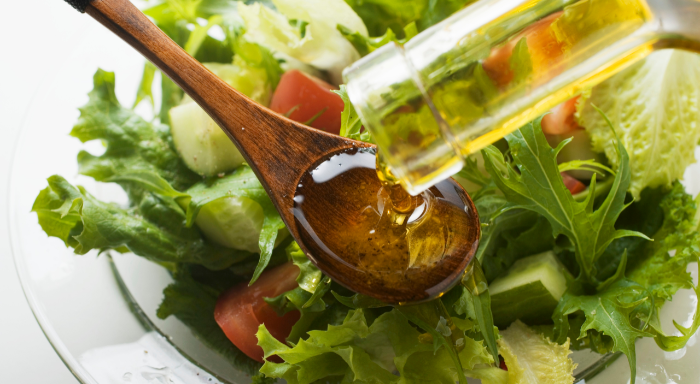
Olive oil is generally considered a healthy fat and is a key component of the Mediterranean diet, which is associated with various health benefits.
However, like any food product, excessive consumption or inappropriate use may have some potential drawbacks. It’s important to note that moderation is key, and different types of olive oil may have varying nutritional profiles.
Here are some aspects to consider regarding potential concerns related to olive oil:
- Caloric Density:
Olive oil is a calorie-dense food, with approximately 120 calories per tablespoon. Excessive consumption without consideration of overall caloric intake may contribute to weight gain. It’s essential to use olive oil in moderation as part of a balanced diet. - Heart Health:
While olive oil is rich in monounsaturated fats, which are considered heart-healthy, it is still a fat source. Consuming too much fat, even the healthy kind, can lead to an excess of calories and potentially impact cardiovascular health if not part of a well-rounded diet. - Processing Methods:
The quality of olive oil can be influenced by the processing methods used. Extra virgin olive oil, obtained through cold pressing and without the use of chemicals, is considered the highest quality. Some lower-quality olive oils may undergo refining processes that can diminish their nutritional value. - Potential for Oxidation:
Olive oil contains unsaturated fats, which are susceptible to oxidation when exposed to heat, light, and air. Oxidation can lead to the formation of free radicals, which may contribute to inflammation and oxidative stress in the body. To minimize oxidation, it’s advisable to store olive oil in a cool, dark place and use it within a reasonable timeframe. - Not Suitable for High-Temperature Cooking:
While olive oil has a relatively high smoke point, it may not be suitable for very high-temperature cooking methods. Using it for deep frying or prolonged exposure to high heat can lead to the breakdown of beneficial compounds and the formation of potentially harmful substances. For such cooking methods, oils with higher smoke points may be more appropriate. - Potential Adulteration:
Adulteration of olive oil with lower-quality oils is a concern in the industry. It’s advisable to choose reputable brands and sources to ensure the authenticity and quality of the olive oil you purchase. - Individual Sensitivities:
Some individuals may be sensitive or allergic to certain components in olive oil. In such cases, consuming it may lead to digestive issues or allergic reactions. It’s important to be aware of personal sensitivities and consult with a healthcare professional if needed.
Despite these considerations, it’s important to emphasize that olive oil, especially extra virgin olive oil, is a valuable component of a healthy diet when used appropriately. Its monounsaturated fats, antioxidants, and anti-inflammatory properties make it a nutritious choice, particularly when replacing less healthy fats in the diet, such as butter.

For accurate and personalized advice based on your specific health circumstances, it is recommended to consult with a healthcare professional or a registered dietitian.
Additionally, referring to reputable sources such as nutritionists, scientific studies, and health organizations can provide more in-depth information on the topic. Please see the “Links” page for some available resources.
Please leave comments, questions or suggestions below.
Tom – Olive Oil Lover

